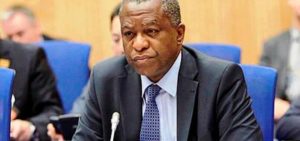 News
News
Obey court orders, Falana tells Buhari, other ECOWAS leaders
Nigerian human rights lawyer, Femi Falana, has called on President Muhammadu Buhari and other leaders of the member states of the Economic Community of West African States (ECOWAS) to “comply with judgments and orders of municipal courts and regional tribunals in the interest of public accountability and political stability.”
The call was made by the lawyer during the “ECOWAS Consultative Meeting on Access to Justice and Respect for the Rule of Law” in Accra, Ghana. Mr. Falana traced “the lack of respect for court orders to prolonged years of military rule and the belief of African leaders that they are as powerful as the emperors and kings who ruled many communities in Africa before colonialism.”
According to Mr Falana, “The intervention of the President is a welcome development in view of the growing culture of impunity in Nigeria. But with respect to the President, it is not sufficient to recognise the court as a civilized forum for the amicable resolution of disputes in a democratic society. The aggrieved litigants require a firm assurance that the party leadership will not follow the bad example of the federal government by treating the judgments and orders of the court with contempt.”
Mr Falana said, “Having now embraced the rule of law, President Buhari ought to direct the State Security Service to release Sheik Ibraheem Elzakzaky and his wife from custody in line with the orders of Federal High Court of December 2, 2016. In the same vein, the orders of the Nigerian courts and the ECOWAS Court for the release of Col Sambo Dasuki (rtd) on bail pending trial should be complied with without any further delay.”
Mr Falana’s paper read in part: “Other high-profile judgments that President Buhari must obey without further delay include at least four judgments obtained by Socio-Economic Rights and Accountability Project (SERAP). The first is the judgment by Justice Hadiza Rabiu Shagari ordering the government to tell Nigerians about the stolen asset it allegedly recovered, with details of the amounts recovered.”
“The second judgment, by Justice Mohammed Idris, ordered the government to publish details on the spending of stolen funds recovered by successive governments since the return of democracy in 1999, while the third judgment, also by Justice Idris, ordered President Buhari to act on reports of investigations into allegations of padding and stealing of some N481 billion from the 2016 budget by some principal officers of the National Assembly, and to ensure prosecution of indicted lawmakers.”
“The fourth judgement by the ECOWAS Court of Justice in Abuja also obtained by SERAP ordered the Nigerian authorities to provide free and quality education to all Nigerian children without discrimination.”
“Nigeria has a duty to show leadership by example in the region since President Mohammadu Buhari is the current Chairman of the Authority of Heads of State and Governments of the ECOWAS. Such leadership has just been demonstrated by the Nigerian leader who has been reported to have distanced himself from the decision of the ruling party in Nigeria, the All Progressive Congress (APC) to expel its aggrieved members who sued the party in court over their grievances against the outcome of the recently concluded primaries of the party.”
“President Buhari should equally show leadership in the region by ensuring that all judgments of the ECOWAS Court against Nigeria are fully and unconditionally obeyed.”
“The hostile disposition of African states to courts is essentially the same. African governments including Nigeria are yet to move away from the era of military and apartheid regimes when martial law was the order of the day. The rule of law is substituted for the rule of rulers. Not only are orders of courts disregarded, judges who rule against governments are harassed by security forces. The same attitude has been extended to regional and international courts.”
 The Economic Community of West African States’ (ECOWAS) Court of Justice has barred the Federal Government of Nigeria, through the National Broadcasting Commission (NBC) from censorship of political programmes by broadcasting stations across the country.
The Economic Community of West African States’ (ECOWAS) Court of Justice has barred the Federal Government of Nigeria, through the National Broadcasting Commission (NBC) from censorship of political programmes by broadcasting stations across the country. The Minister of Foreign Affairs, Geoffrey Onyeama,has assured the Economic Community of West African States (ECOWAS) and the United Nations election monitoring team of credible elections in 2019 during the 41st Ordinary Session of the ECOWAS Mediation and Security Council which held in Abuja on Thursday,the 13th November.
The Minister of Foreign Affairs, Geoffrey Onyeama,has assured the Economic Community of West African States (ECOWAS) and the United Nations election monitoring team of credible elections in 2019 during the 41st Ordinary Session of the ECOWAS Mediation and Security Council which held in Abuja on Thursday,the 13th November. The ECOWAS Community Court of Justice has fixed 11th December 2018 to deliver the rescheduled judgments in two cases brought by Nigerians alleging the violation of their human rights by the Federal Republic of Nigeria.
The ECOWAS Community Court of Justice has fixed 11th December 2018 to deliver the rescheduled judgments in two cases brought by Nigerians alleging the violation of their human rights by the Federal Republic of Nigeria.